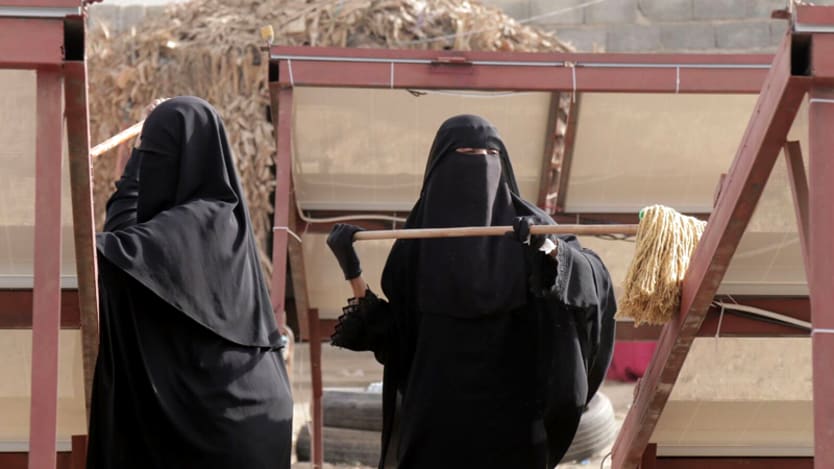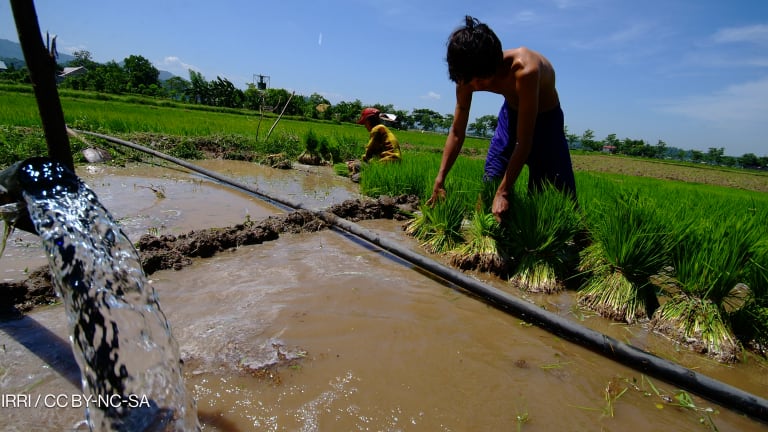
WASHINGTON — Solar panels are providing women in Yemen access to energy and a way to escape famine conditions that continue to threaten the country.
The nearly four-year war in Yemen has left half of the country’s 29 million people hungry on a daily basis and killed an estimated 85,000 children from starvation. To tackle this pervasive food insecurity, the United Nations Development Programme is teaching women to run their own small businesses by generating energy with solar panels.
The program provides women access to materials and training to start microbusinesses that can sell energy to power community services such as water and health systems.
“To overcome the risk of food insecurity, you need to have income opportunities.”
— Arvind Kumar, project manager, UNDPThe earned income is enough to buy food and other household necessities, while also providing economic independence that women in Yemen often don’t experience.
“It’s not a lack of access to food, it’s more of a lack of access to income. The food is available, but because of the increasing and decreasing Yemeni rial and the fact that many communities and many women no longer have access to employment, they can no longer afford to purchase the food,” said Leanne Rios, communications and advocacy team lead at UNDP Yemen.
“When you’re talking about food insecurity here in Yemen, versus potentially other places where food insecurity is more based on drought or agricultural issues, it’s quite the opposite.”
UNDP currently has 200 successful microbusiness projects throughout the north and south of the country working to provide cheaper energy in a context where fuel to run homes, businesses, schools, and health facilities has become prohibitively expensive. A collapse of local government services has left the civilian population and NGOs to fill in the gaps.
UNDP has focused programming on empowering women, who do not traditionally work outside the home in Yemen but are now often the breadwinners for their families after several years of war.
That income generation also helps offset the cost of powering other basic services such as community health and water systems. The increasing solar power supply has made those services less expensive, freeing up more income for food or other household expenses. It also cuts down on the need to travel great distances to access such services, which can also cost money that is needed for food.
“To overcome the risk of food insecurity,” UNDP Project Manager Arvind Kumar said, “you need to have income opportunities.”
The war has disrupted the agricultural sector, which had previously employed 55 percent of the country’s labor force, according to UNDP. A cutoff of seed exports and other agricultural necessities due to blockades as well as the lack of men available for agricultural work has strained the country’s ability to provide food for the population.
Generating energy that can power water systems via microbusiness also improves public health. Kumar said that 90 percent of Yemen’s water systems are motorized, and maintaining them after diesel prices spiked became too costly.
Cholera in Yemen declining since peak last year, but outbreak still a risk
The rainy season places more stress on fragile health, water, and sanitation systems in Yemen, and increases the risk of a renewed cholera outbreak, UNICEF deputy country director told Devex in 2018.
“Services like health facilities, schools, the water system, the irrigation, are at the brink of collapse … What we have witnessed with cholera was something preventable,” Kumar said. “Not having diesel on a regular basis has led to a lot of cholera-related cases.”
Despite the challenges that come with operating such a program in a context such as Yemen — where blockades sometimes mean solar panel supplies are delayed getting into the country and getting permission from authorities to run programs can take months — Kumar said solar power generation could have an even greater impact.
“We found that even after two years of our interventions, 100 percent of women entrepreneurship [projects] are successful,” Kumar said, noting that the amount of money generated is modest but meaningful. “This gain is limited, but it can be replicable in higher scale.”








